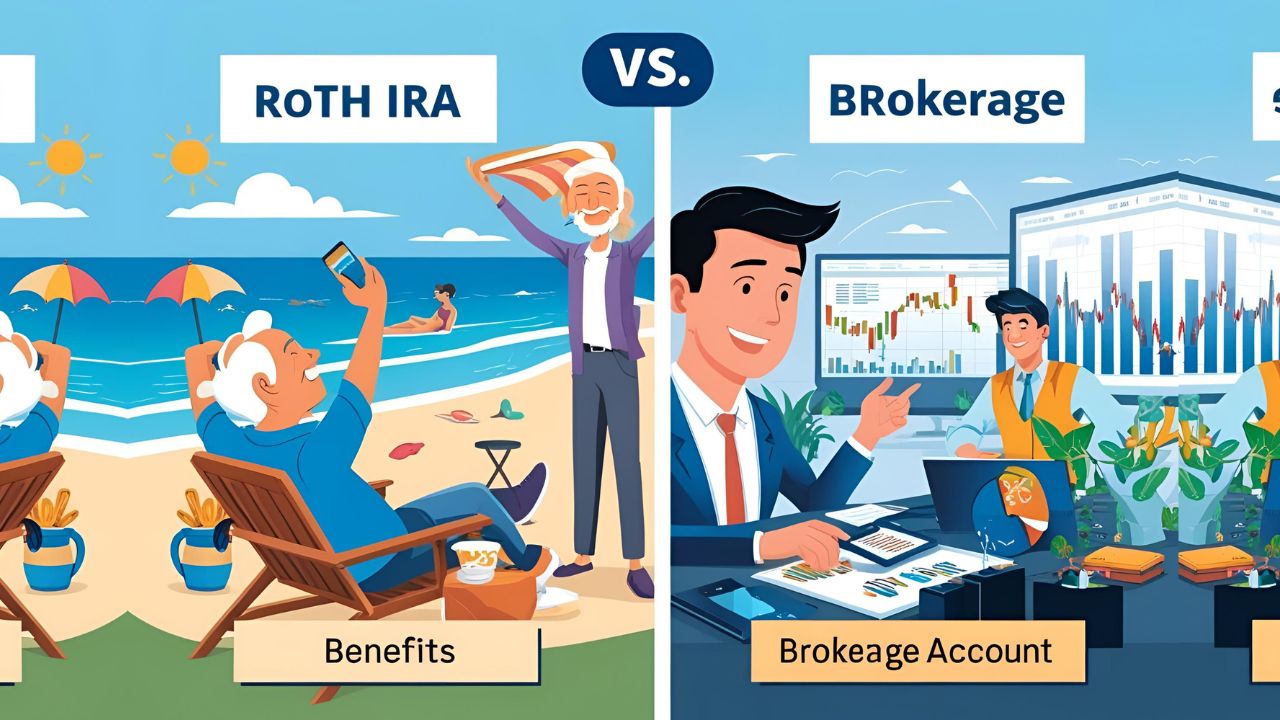At what stage do you want to start investing?
One of the many decisions you must make along your investment journey is selecting an account type best tailored to your needs. A poor choice may lead to a waste of time and money. Some of the most common choices are Roth IRAs and standard brokerage accounts. Each option has its clear pros and cons.
Let’s examine both possibilities to understand their differences and determine which one best suits your goals.
What Is A Roth IRA?
An individual retirement account is an investment account designed for long-term savings. Roth IRA accounts Compared to traditional IRAs, Roth IRA accounts allow for post-tax investments, which means users only need to pay taxes on withdrawals. While the investments are tax-free, there are some tax rules during retirement. Contributions are capped at $7000 annually. This amount increases to $8000 if the individual is over 50. Directly contributing to Roth IRA accounts requires the user to have qualifying income limits of 146000 for single filers or 230000 for couples filing jointly.
The most notable benefit of a Roth IRA is that it offers tax-free growth and withdrawals during retirement. You can withdraw your contributions anytime without taxes or penalties, though no earnings can be removed. Earnings may be taxed, along with penalties, if withdrawal occurs before five years and the account holder is younger than 59½ years. Additionally, a Roth IRA holder must be of any age by which the individual must start withdrawing money from the account. This aspect is quite helpful while thinking of estate planning.
On the other hand, Roth IRAs are subject to restrictions on income and annual contributions. Such limits could be challenging for high earners or those wishing to invest more money.
What is a Brokerage Account?
A brokerage account is a basic investment account allowing the holder to trade various stocks, bonds, mutual funds, and exchange-traded funds (ETFs). No income or contribution limits mean funds can be deposited without restrictions. Regardless of age, any individual can open these types of accounts, and there are no limitations on when money can be withdrawn and for what purposes.
The most significant advantage of a brokerage account is its use for spending purposes like purchasing a home, starting a new business, or even going on a vacation. However, there are some disadvantages, too, as you will still be taxed on dividends, interest, and profits from selling investments. Additional taxes also won’t provide any advantageous features for deposits and withdrawals, so tracking gains and losses using complicated tax calculations will be necessary.
Within brokerage accounts, users face the unprotected challenge of market risks, requiring either self-management or payment for professional management. Concerning penalties around fund withdrawal, there are no restrictions on access or penalties, meaning all earned investment profits will still be taxable.
Key Differences Between Roth IRA and Brokerage Account
The center of focus around these accounts will be their taxation methods. Withdrawal restrictions on Roth IRA accounts are softer compared to brokerage accounts, as contributions trigger taxation while investment growth remains tax-exempt, allowing penalty-free withdrawal during retirement. In stark contrast is the brokerage account, where taxation is imposed on capital gains, dividends, and interest. Unlike brokerage accounts, contribution limits are set under Roth IRAs, which have income that one can contribute to in a year.
Also, there are no limitations concerning withdrawal from brokerage accounts, and unlike with Roth IRAs, there is no financial penalty for early withdrawal. With Roth IRAs, an account holder may enter a period of economic inactivity where no distribution is mandated. Still, brokerage accounts have unrestricted spending without limits since they do not function as retirement accounts.
Similar investment options are available for both account types. However, due to different providers, some may offer more advanced investment options tailored towards retirement, like Roth IRAs, which leads to fees that are variable from one provider to another.
When to Choose a Roth IRA
Withdrawals and account growth without taxation make Roth IRAs appealing to individuals who expect to be in a higher tax bracket later in life. Lesser restrictions, such as no required minimum distribution and accessible contributions, make Roth beneficial for those looking to amass wealth for several decades through tax sheltering.
Brokerage Accounts For Everything Other Than Retirement
A brokerage account will suit you best if you want greater flexibility and do not want to be limited by a contribution or income cap. This is ideal for you if you want to access funds before retirement or if you wish to invest large sums of money. A brokerage account is also suitable for other goals besides retirement, such as saving for a house, starting a business, or unrestricted wealth-building. You need to be prepared to manage your investments and pay tax on the profits, but there is unrivaled convenience in unrestricted access to funds that can be invested or withdrawn at any time.
Can Both Accounts Be Used Together?
Certainly not! However, most investors tend to hold a Roth IRA in combination with brokerage accounts, as this offers maximum investment flexibility. A Roth IRA can be funded to permit tax-free retirement savings while maintaining a brokerage account for other investment objectives or amounts beyond the Roth IRA’s contribution limit. Each of these accounts has distinct advantages, and strategically, using both enables an investor to implement a multifaceted investment plan.
Frequently Asked Questions
Any withdrawals made on a Roth IRA’s earnings before the user is 59½ years old will attract taxes and a 10% fine if the account has not reached the five-year mark. Contributions can be withdrawn at any time without penalties. In the case of brokerage accounts, withdrawals can be executed at any time, although realized gains will face taxation. There is no direct rollover option from Roth IRAs to brokerage accounts, but both accounts may be strategically used for different purposes.
Conclusion
Opening a brokerage account or Roth IRA involves evaluating goals and timelines and identifying tax consequences. Roth IRAs make more sense to use for retirement savings as they are better from a tax perspective, while brokerage accounts do not lock users to long-term objectives. A combination of both accounts has become popular among investors as users look to balance financial flexibility with tax-advantaged growth. Explore options, conduct proper research, and remember that financial advisors are always ready to assist with tailored recommendations.
You may read this: Upcoming US IPOs May 2025: Hinge Health, MNTN & Kandal M















